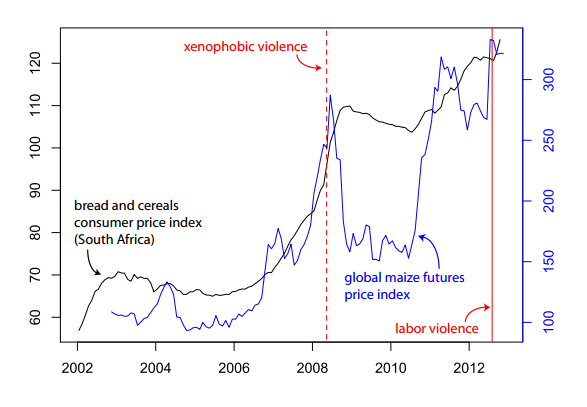South Africa, Riots and the Price of Food
On 16 August 2012, 34 workers at the Marikana platinum mine in South Africa were killed during violent protests over pay. The incident was the single most lethal use of force by the South African security forces against civilians since 1960.

The background to the protests was the widespread view that the high profits generated by platinum mining were in stark contrast to the low wages of the workers. The miners had downed tools in protest and demanded a fair wage.
Today, Yaneer Bar-Yam and pals at the New England Complex Systems Institute in Cambridge, Massachusetts, say that another factor plays an important and underrated role in the civil unrest in South Africa.
Bar-Yam’s theory is that global food prices and the likelihood of riots are closely correlated. The bottom line is that when people cannot afford to feed their families, their only way of bringing about change is civil disobedience.
With that in mind, Bar-Yam and colleagues show that worker wages in South Africa have not kept up with the drastic increases in recent years in the price of food. The price of food in South Africa has more than doubled since 2006.
In particular, the New England team show that the 2012 riots coincided with a sharp spike in the price of maize caused in large part by drought in the US. They also show that a similar hike in prices occurred at the same time as other riots in South Africa in 2008.
Readers of this blog will have come across this idea before. Bar-Yam has been tracking the link between food prices and riots for some time, showing for example that the civil unrest in North Africa in 2010, which became known as the Arab Spring, was closely correlated with rising food prices.
Bar-Yam says that it is not food prices themselves that cause riots. The effects are more subtle. Instead, when prices rise above some threshold, this creates the conditions in which riots are more likely to occur, like tinder in a dry forest.
It also leads to the obvious prediction that riots are likely in the near future, particularly in countries that are heavily dependent on maize, if food prices continue to rise. Places at risk include Haiti and Argentina, both of which have experienced food-related protests in recent months.
So what to do? The New England team point to two factors that particularly contribute to rising food prices. The first is the US policy of converting maize to ethanol which removes an important foodstuff from the food supply and pushes up prices. The second is speculation on commodity futures markets that pushes up food prices causing bubbles and crashes.
Bar-Yam and co say that changes in regulation could help reduce the impact of both of these factors, something the US is uniquely positioned to do. In addition, it ought to be possible to mitigate the impact of high and volatile food prices in other ways, such as subsidising certain foodstuffs.
Without this kind of action, the consequences are likely to be dire. Bar-Yam and co are surely understating matters when they conclude that: “Without attention to the global food price situation, more incidents of food-based social instability are likely to arise.”
Ref: http://arxiv.org/abs/1307.5268 :South African Riots: Repercussion of the Global Food Crisis and US drought
Keep Reading
Most Popular
Large language models can do jaw-dropping things. But nobody knows exactly why.
And that's a problem. Figuring it out is one of the biggest scientific puzzles of our time and a crucial step towards controlling more powerful future models.
How scientists traced a mysterious covid case back to six toilets
When wastewater surveillance turns into a hunt for a single infected individual, the ethics get tricky.
The problem with plug-in hybrids? Their drivers.
Plug-in hybrids are often sold as a transition to EVs, but new data from Europe shows we’re still underestimating the emissions they produce.
Stay connected
Get the latest updates from
MIT Technology Review
Discover special offers, top stories, upcoming events, and more.